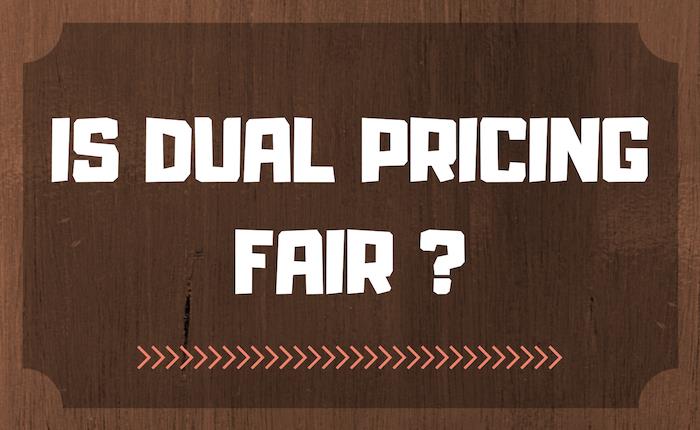Is dual pricing fair?
Dual pricing has long been a subject of contention among the expat community. While most holiday makers probably don't realise a dual economy exists, even though they may pay up to a third more than a Local would on many items in tourist area, the large majority of expats grumble at paying more for goods and services than locals.

What is dual pricing?
There are different forms of dual pricing, but they all come down to the same basic principle. If you are a foreigner, you will be charged more for goods and services than if you are local. This could be a small increase in price, twenty bucks more or so, or a significant increase, think five times the price or more. That seems like a rather significant difference, and it is, but if you traveled here on a plane and are staying in a fancy resort, you can probably afford the higher price. At least that is the logic behind the practice.
Dual pricing has long been a subject of contention among the expat community. While most holiday makers probably don't realise a dual economy exists, even though they may pay up to a third more than a Local would on many items in tourist area, the large majority of expats grumble at paying more for goods and services than locals.
And this is totally understandable. I mean, once you've lived in a country for five or so years, you'd expect to be treated like a local, right?
It isn't just street stalls and local shops that operate a dual economy, either. Many museums and national heritage sites stipulate dual pricing on entry, which is never usually more than a hundred bucks difference, but enough of a difference to rile some expats.
Historical Connection
Before we get into why there is a valid reason for dual pricing in some cases, it's important to look at the economy in it's historical context.
We consider Thailand for example, where dual pricing is found on all the levels.
Thailand economy today is like pseudo-capitalist economy. many of the older generation still alive today will have grown up in a rural barter system economy. Thailand has not experienced the immigration or multi-culturalism. Thailand has very few foreigners, and trade laws and the buying of land and housing is still very restrictive for foreign nationals. So dual pricing is somehow everywhere in the system.
The culture
Thailand is historically very insular. Thais promote a unity of deep national pride, patriotism and self-identification with flag and country. Anyone outside of that will always be a farangi?.
No matter how well you understand Thai, no matter how long you've had a Thai partner, no matter that your child is half-Thai and no matter how many Thai friends you have, you are, and always will be, a farang. So no, you can't roll up to Doi Suthep temple in Chiang Mai and say, Can I pay the Thai price to get in because my wife is Thai? Or, Can I pay the Thai price because I've poured many pounds into the Thai economy over the last ten years?. No, because you are not Thai.
The reality
The reality is that dual pricing has evolved with Thailand; it has a sort of natural existence embedded in the bartering culture. In numerous Asian and Middle-Eastern countries this is the case. Friends, family and regulars tend to pay less; it's quite simple. So it is indeed not racism, but referral advantage.
Also at public places, museum the prices are different for Local and a farangi?, but it's not a pure racism or difference. The average income of Thai family is limited. The majority of Thais will never be able to take a holiday in a foreign land. In fact, the majority of Thais have never visited the beautiful islands and wonderful corners of their own country. So the government has kept the prices lesser, so the locals can afford to visit such places. Thailand or any other asian country is poor than developed countries like UK, USA.
This isn't about discrimination. This is about sensible economics. Sure, there are many well-off Thai people who get the Thai price when they can clearly afford more than the average foreigner. The percentage is very less.
So my personal opinion is, stop being sensitive, and instead be compassionate enough to accept that this isn't discrimination. The authorities don't set a Thai price to discriminate but to give those with considerably less money. This enables poorer families to have more freedom; to take the kids out, to enjoy their local community. It also enables poorer families to save more money.
I don't think it is right to judge whether it's right or wrong. In my opinion it is not a separation or discrimination. The system is due to ethical and viable reason. I have spend around ten years in Thailand now, being farangi i have never faced any other bad experience here. Still with the globalisation I see one price for all at many places.
So, on this my opinion would be - Chill, relax and have fun! Plan your vacation now.